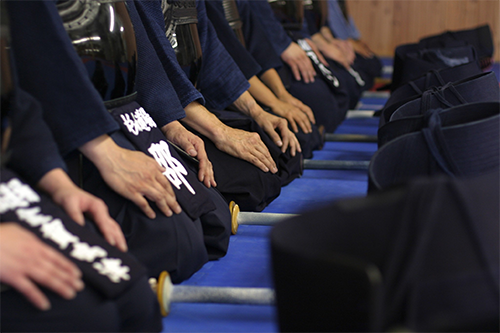Budo: The Martial Way of Discipline and Enlightenment
By Renshi Aaron Kenneally

Budo in Japan
Budo, often translated as the "martial way," is a holistic and philosophical approach to martial arts deeply rooted in Japanese culture. It extends beyond the physical techniques of combat to encompass spiritual and ethical dimensions. Budo is not just about fighting; it's about self-improvement, discipline, and a journey toward enlightenment. In this article, we will explore the essence of Budo, its origins, principles, and the profound impact it has on individuals and society.
Origins of Budo
The concept of Budo traces its origins to ancient Japan when the samurai, the noble warrior class, practised martial arts for self-defence and battlefield combat. These martial arts included disciplines such as Kenjutsu (swordsmanship), Jujutsu (unarmed combat), and Kyujutsu (archery). Over time, the samurai refined their techniques and incorporated philosophical elements, giving rise to the principles of Budo.
The Philosophy of Budo
At the heart of Budo lies a set of principles and values that guide the practitioner's journey:
-
Discipline (Kokoro): Budo emphasizes rigorous training and self-control. Discipline of the mind and body is essential for mastering martial techniques and achieving personal growth.
-
Respect (Sonkei): Respect for one's instructors, training partners, and opponents is fundamental in Budo. This respect extends to all aspects of life and fosters a spirit of humility.
-
Self-Improvement (Kaizen): Budo encourages continuous self-improvement. Practitioners strive to refine their techniques, enhance their character, and develop a sense of inner peace.
-
Balance (Wa): Budo seeks to harmonize the mind, body, and spirit. Achieving balance is not only crucial for martial effectiveness but also for living a fulfilling life.
-
Moral Integrity (Gi): Upholding moral values such as honesty, integrity, and justice is integral to Budo. Practitioners are expected to act ethically both inside and outside the dojo (training hall).
-
Courage (Yuuki): Budo cultivates courage in the face of adversity. It teaches practitioners to confront challenges with bravery and determination.
-
Empathy (Jin): Understanding and showing compassion toward others, including opponents, is a key aspect of Budo. It promotes empathy and the avoidance of unnecessary conflict.
The Three Pillars of Budo: Bujutsu, Bugei, and Budo
Budo encompasses three main aspects, each with its unique focus and purpose:
-
Bujutsu: Bujutsu, often translated as "martial technique" or "martial science," is the practical application of martial arts for self-defence or combat. It involves the study of physical techniques and strategies.
-
Bugei: Bugei refers to the martial art aspects of Budo, encompassing a broader set of elements that go beyond combat skills. It includes the cultural and historical aspects, as well as ethical values and etiquette associated with martial arts.
-
Budo: Budo is the highest expression of martial arts, emphasizing the spiritual and ethical dimensions. It combines physical training with mental and moral development, focusing on self-improvement and enlightenment.
The Influence of Zen Buddhism
Zen Buddhism plays a significant role in the practice of Budo. Zen's teachings on mindfulness, meditation, and living in the present moment align closely with the goals of Budo. Zen principles emphasize the importance of inner peace, clarity of mind, and the integration of mind and body—values that resonate deeply with Budo practitioners.
Budo in Practice
Budo is practised through various martial arts disciplines, each with its techniques and traditions. Some well-known Budo disciplines include:
-
Karate: Known for its striking techniques, Karate emphasizes strong, precise movements and is often associated with discipline and self-control.
-
Judo: Judo focuses on throws, pins, and joint locks, emphasizing the use of an opponent's strength and balance against them.
-
Aikido: Aikido teaches the redirection of an opponent's energy and the use of minimal force to control or disarm.
-
Kendo: Kendo is the way of the sword, involving the use of bamboo swords (shinai) and protective armour (bogu).
-
Iaido: Iaido focuses on quick and efficient drawing and cutting with the Japanese sword (katana).
The Enduring Legacy of Budo
Budo continues to have a profound impact on individuals and society:
-
Personal Growth: Budo offers a path to self-improvement, helping individuals develop physical skills, mental resilience, and ethical values.
-
Cultural Heritage: Budo is an integral part of Japan's cultural heritage, and its influence can be seen in traditional ceremonies, art forms, and festivals.
-
Global Reach: Budo has gained popularity worldwide, with practitioners from diverse backgrounds embracing its principles for self-defence, fitness, and personal development.
In conclusion, Budo represents a unique and profound martial philosophy that goes beyond combat techniques to encompass the principles of discipline, respect, self-improvement, and moral integrity. It is a way of life that resonates with those seeking not only physical skills but also inner peace and enlightenment. Budo serves as a testament to the enduring power of martial arts as a means of personal and societal transformation.
Book a Free Trial Class at Bushido Karate Club
Bushido Karate Club is currently accepting new members. Contact us today to book a trial class in Douglas or Carrigtwohill and begin your karate journey. Places are limited so call today to avoid disappointment.
Tel: +353876307006






